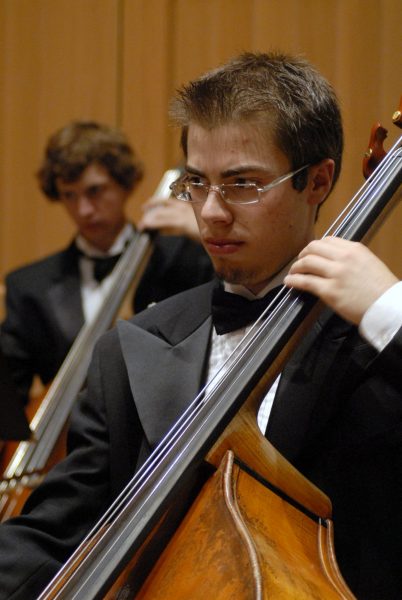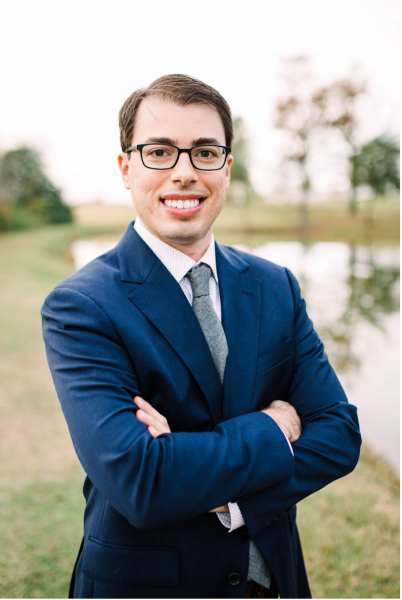
When David Saccardi graduated from Colorado State University in 2011, he did not realize the groundwork was laid for something more prestigious. He was recently awarded the position of associate professor at Louisiana State University, teaching classes in music education and psychology of music.
During his undergrad at CSU, Saccardi studied with some of the finest musicians and teachers, including Wes Kenny (retiring director of orchestras), Forest Greenough (double bass professor), and Steve McNeil (retired music education professor). They were all pivotal figures in shaping the musician and educator that Saccardi is today.
“I had an embarrassment of good mentors at CSU. Forest was an excellent musical mentor during my time there and helped shape my musicianship. Wes Kenny had just started at the university when I was there. Sitting in his orchestra the years I was at CSU, and all the years I played in Fort Collins Symphony, were instrumental in shaping how I teach and rehearse an ensemble, even down to the beginning level. I also took many music ed courses with Steve McNeal; I took string tech with him, and he let me T.A. He also introduced me to my wife! Those three men were extremely instrumental in my formation as a teacher; their lessons are, by and large, many of the lessons I still pass on to my undergraduate students,” Saccardi said.
A music teacher right out of college
Saccardi credits CSU for preparing him for his time as director of orchestras at Loveland High School and Bill Reed Middle School, where he taught from 2011 to 2017. Sacardi was hired with a mandate from Thompson School District to build orchestra programs at the two schools.
“As a new teacher, I had to do just about everything to build and maintain a large and successful music program, including recruiting students, raising money to buy instruments and music, going to contests, getting kids in lessons, and finding quality instruments,” Saccardi said.
Not only did Dr. Saccardi build the program from scratch, but he was appointed curriculum lead for the school district, put on seven musicals, and was an assistant band director for the state championship marching band.
A fresh perspective
After four years of teaching in Loveland, Saccardi needed a fresh perspective and pursued a master’s at the University of Michigan’s summer program for working teachers. With expectations for something like his undergraduate degree experience, Saccardi was initially disappointed.
“The first class I took was Introduction to Research, which was writing a long paper. I had no idea there was a research piece to [the program]. I was ambivalent and angry about it at first because my expectations weren’t being met,” Saccardi said.
Even though these in-depth studies seemed foreign, Saccardi realized that research was in his blood. As a child of a scientist who worked at the University of Colorado, he grew up going to Science Saturdays and watching his dad write scientific papers. What started as angst and forced writing eventually became a labor of love as Saccardi realized this medium was stimulating on an entirely different level and one that combined his scientific and musical mind.
Saccardi’s love of research continued during his Ph.D. program at the University of Texas. “I went into higher ed to become a researcher. I like the process of generating and discovering new knowledge that can impact music teaching and learning,” he said.
Saccardi also explored studies in the psychology of music, training alongside psychology majors in methods in behavioral research, experimental design, and statistical analysis. “Erik Johnson does all this stuff too. It was actually his agenda that prompted my interest in peer teaching,” he said.
A passion for string instruments
As a child, Saccardi started on viola, switched to cello, and landed on double bass.“It was one of several instances in my development that at the time seemed haphazard, but in hindsight was part of the progression of where I am today,” Saccardi said.
Throughout his career, Saccardi absorbed and traded knowledge of bass technique with other educators, developing a deep pedagogy for his principal instrument and becoming competent on all the string instruments. While at the University of Texas, he was in a leadership role with the Strings Project, a community program and training vehicle for undergraduate string music education majors.
He is also a registered Suzuki teacher, an active Suzuki Association of The Americas member, and one of only a few Suzuki double bass teachers in the country.
“I actually just gave a lecture last Friday on Suzuki bass. We have a big bass festival here at LSU, so I made all the participants play Twinkle, [twinkle little star],” Saccardi said.

Nostalgic for secondary school
Now that Saccardi has a terminal degree from one of the most advanced institutions for learning, he still feels nostalgia thinking about his days teaching middle and high school orchestra.
“The thing I miss the most about teaching secondary school is the relationships you’re able to cultivate with students. When teaching in Loveland, I had students for seven years from 6th through 12th grade. And that was special to be such a big part of their lives during such a formative time,” he said.
Reminiscing aside, Saccardi found his niche in higher ed. Though his connection with college students is different than at the secondary level, he enjoys teaching advanced concepts that are more complex. From time to time, though, materials created during his time in Loveland are now passed on to his teacher candidates, bringing everything full circle.
